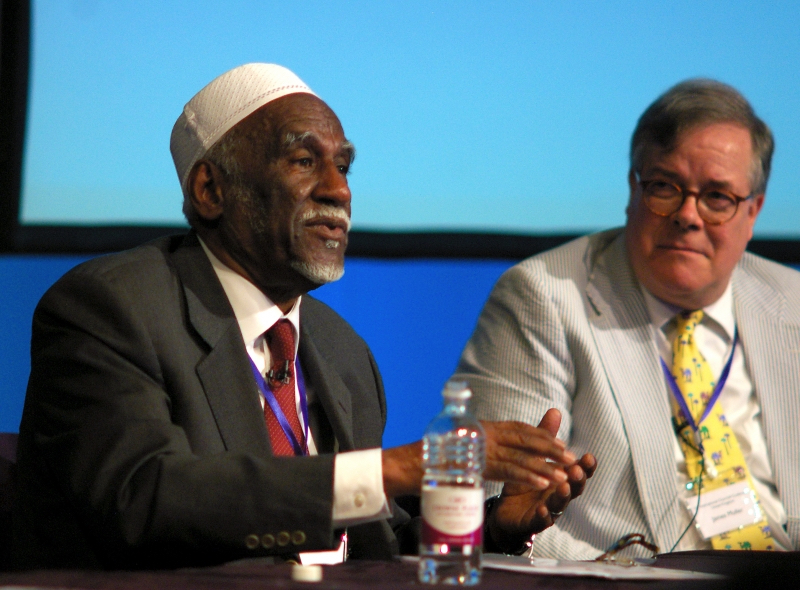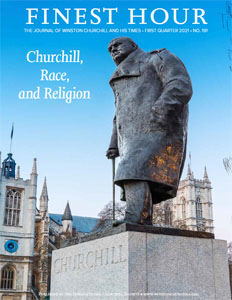Finest Hour 191
Churchill and Islam

Imam Ahmed Abdel Rahman El Mahdi
February 21, 2021
Finest Hour 191, First Quarter 2021
Page 32
By Imam Ahmed Abdel Rahman El Mahdi
Imam Ahmed Abdel Rahman El Mahdi is the grandson of the Mahdi—Mohammed Ahmed ibn Abdallah—who led a jihadist uprising by the Ansar (as the Mahdi’s followers were known) against Turco-Egyptian rule in Sudan in the late nineteenth century. This brought about the death of General Gordon in Khartoum in 1885, which in turn led to the River War of 1896–1899 involving a young Lieutenant Churchill. The Imam spoke at the thirty-second International Churchill Conference on 28 May 2015. The full text of his speech is printed in FH 170. Here follow extracts.
Ladies and gentlemen, I am delighted to be here today to take part in this important conference and to speak in this session on Churchill and Islam. Churchill’s involvement in the Sudan was an important aspect of his amazing life. Churchill showed a remarkable degree of interest and insight into Islam. The Muslim world formed an important part of the British Empire. Apart from the relations with the Ottoman Empire, which governed most of the Muslim world, there were millions and millions of Muslims under British rule.
Churchill’s earliest contact with Islam was in India in 1896, when he must have had direct and practical relationship with Muslims. He is known to have had positive views about Muslims whom he fought with or against.
But one of his early deep encounters with the Muslim world came in 1898 when he was attached as a soldier and journalist to Kitchener’s great expeditionary force to re-conquer the Sudan and avenge the death of General Gordon. There he came face to face with Mahdism. The Mahdi was not only waging a holy war against the corrupt Turkish administration of the day but also leading a revolution to reform Islam. The Mahdi saw himself not just as a Sudanese national leader, but as the expected Saviour that the Prophet Mohammed had promised would one day come to inspire reform, achieve justice, and show the true path for the faithful in times of difficulty and despair.
The Mahdist Revolt
The Mahdi claimed that he had received direct inspiration from the Prophet Mohammed himself and that his divine mission was to revive the path of the Koran and the Sunna and to establish a new doctrine for the future of Islam. The new creed of Mahdism was to run as follows: God is One, Mohammed is His messenger, and Mohammed El Mahdi is the successor of His messenger. This new creed was inscribed on the banners of the Mahdists. The four great banners were White, Black, Green, and Red.
The government in Khartoum sent a senior officer with some notables to order the Mahdi to come to Khartoum. They argued that he ought to follow the Koran that instructs Muslims to obey their rulers. The Mahdi answered that, from now on, he was the ruler. The result was the first battle at Aba Island. The seat of the Khalifa of Islam was no longer in Constantinople. The Mahdi assumed authority over all Islam. He, his family, his successors, and his comrades, were all in the line of descent from the Prophet Mohammed.
His outlook represented a new order that was to surpass and override all the traditional sects and establish a doctrine on the basis that every age has its merits and every time has its men. “We are no longer obliged to follow blindly the opinion of our learned jurists who lived ages ago. They had their opinion, we have ours,” said the Mahdi, “and if they were living today they would follow me for I have direct inspiration from the Prophet Mohammed himself.”
Mahdism was a reformation movement within the Muslim world. It had no quarrel with Christianity or any other religion, nor was it a movement against the West, as such. But Britain’s colonial involvement in Sudan inevitably brought about conflict. This explains the Mahdi’s extraordinary policy towards General Gordon. The Mahdi eagerly welcomed Europeans who accepted Islam and offered peace and dialogue to those who refused it.
Father Ohrwalder, the Austrian priest who preached Christianity in Sudan’s Nuba Mountains, bore witness to how respectful the Mahdi was towards Christianity and how keen he was to discuss religion with a Christian priest. He writes in his book Ten Years’ Captivity in the Mahdi’s Camp: “After a long conversation on the Psalms of David, the Mahdi said: ‘I know that you, Christians, are very good people and that you feed the hungry’” (122). Ohrwalder mentions in his book how the Mahdi repeatedly calls him to interviews. The Father was really a captive of war, not a captive of the Mahdi.
General Gordon
When Churchill arrived in Sudan in 1898, he would have heard all about the Mahdi’s relations with General Charles Gordon, who was killed in the Mahdi’s siege of Khartoum in 1885. The Mahdi deliberately prolonged the siege of Khartoum, against the advice of his generals, in order to give Gordon as much time as he could to change his mind. Had it not been for the attempted advance of the Relief Expedition towards Khartoum, the Mahdi would probably have never allowed the attack on Khartoum. The miracle he hoped for was the surrender of Gordon, not the reddening of the Nile with blood up to Cairo, as portrayed inaccurately in the [1966] film Khartoum. Churchill observed that the Mahdi would rather have converted Gordon than conquered him. Churchill also noted in The River War that General Gordon “proposed to visit the Mahdi himself and try to arrange matters with him personally. Perhaps he recognised a kindred spirit. The Government in this case very naturally forbade him” (I 75).
The correspondence between the Mahdi and Gordon, together with Gordon’s journal, sheds an interesting light on their relationship. It is unfortunate that this correspondence has not received the attention it deserves from historians. Gordon had a belief and a vision. His first letter to the Mahdi shows that he thought the Mahdi was simply seeking power and control over Western Sudan rather than a complete reform of the Muslim world. “Give the Mahdi Kordofan and the West, bring Zubeir Pasha to rule the North, satisfy the Khedive in Egypt by nominal authority, and peacefully walk out to Belgium and another part of Africa.”
The elaborate and gentle answer of the Mahdi showed that compromise was impossible. Gordon was furious and never turned back. The Mahdi and his Generals begged him to surrender. The Mahdi went as far as to ask him not to commit suicide, quoting the Koran: “Don’t kill thyself, for God is merciful.”
Although Gordon misunderstood Mahdism, the Mahdi admired Gordon’s personality and integrity. He described him as the wisest of his people and was keen to establish direct contact with him. He once sent him a trustworthy woman to bring back his answer. He urged him to bring the right person to translate his letters so that there would be no misunderstanding and offered to send him whoever he wanted as mediator between the two of them. The Mahdi never gave up the hope of coming to terms with Gordon. And there is sufficient evidence that the Mahdi never wanted Gordon killed. That is why, up to this day, we do not know for sure who was really responsible for the death of Gordon.
Professor Mekki Shibeika, the distinguished Sudanese historian, writes:
Although the Mahdi was in complete control of the situation and the siege of Khartoum, was confident of the loyalty of his followers who were eagerly awaiting the order of their Imam to take the fortified city, and believed in his continuous and overwhelming victories over his enemies, he nevertheless tried to use peaceful persuasion to avoid bloodshed. He addressed Gordon politely, describing him as “he who is dear to Britain and the Khedive” and always used his title “Pasha.” In acknowledgement of Gordon’s reputation, the Mahdi offered to allow him to leave Khartoum and join the British without any ransom and with his dignity and honour intact, bearing in mind that the objective of the Relief Expedition was to save General Gordon, as was clear from Lord Wolseley’s instructions. So, if Gordon had gone peacefully to his people, the Expedition would have achieved its aims.
That might have been possible, but the leader of the “Ever-Victorious Army of China” would not yield, and he came into clash with another Ever-Victorious Army. The Mahdi warned that in front of his army marched the Prophet Himself, behind Him the Angel Azrael, Peace be upon Him, holding a luminous banner, and around him the four Khalifas and all the dignitaries of Islam both dead and alive, and that the Prophet had presented him with The Sword of Victory. So no one could conquer him.
Dr. David Mowat of Oxford University in his most interesting play for the BBC, To Die in Africa, showed how desperate the situation was in Khartoum yet how adamant Gordon was and how strongly he believed that God was on his side. So, alas, the two Ever–Victorious armies had to fight it out.
Gordon’s last letter to the Mahdi was much more conciliatory. In contrast to the aggressive tone of his previous letters, Gordon told the Mahdi that he would open the gates of Khartoum and allow its citizens to go over to the Mahdi. He asked the Mahdi to treat them as befitted a man like himself, and said he was sure of the Mahdi’s mercy towards them because they were his nationals (Naom Shukier, Geography and History of the Sudan, p. 850).
Lt. Churchill
Now, all this must have been of great interest to Churchill, a young intellectual and die-hard imperialist, who was not part of the Relief Expedition, but joined the Avenging Expedition. Whereas the Relief Expedition failed, the Avenging Expedition did not. The Mahdi died only six months after General Gordon in 1885 but the Mahdist state continued under the leadership of his Khalifa Abdullahi.
After its occupation of Egypt in 1882, Britain inevitably became involved in Sudan. At the time of Gordon, its involvement was defensive. But developments in Europe, political temperaments in Britain and the situation in Egypt and in Africa paved the way for an offensive policy aimed at the re-conquest of Sudan in the name of Egypt. The plans and preparations for that re-conquest were to allow no chances for defeat.
The force mobilized by Kitchener against the Mahdists had far more advanced weapons and logistics than Africa had ever experienced before, including Maxim guns, gunboats, and railways. So the battle of Omdurman was easily won but at the cost of being one of the bloodiest massacres ever.
It may suffice to quote Churchill’s words: “Thus ended the battle of Omdurman—the most signal triumph ever gained by the arms of science over barbarians. Within the space of five hours the strongest and best-armed savage army yet arrayed against a modern European power had been destroyed and dispersed, with hardly any difficulty, comparatively small risk, and insignificant loss to the victors” (The River War, II 164). Churchill admits that the Khalifa was conquered by the railway. He noted that the Mahdists were not conquered but destroyed.
The bravery and martyrdom of some 25,000 Mahdist soldiers armed only with spears and obsolete rifles who tried to stand up to a far superior colonial army equipped with maxim guns is still commemorated in Sudan.
There are many books about the battle of Omdurman from a military perspective but none have the depth and insight of Churchill’s The River War. This book is familiar to many Sudanese especially now that it is available in Arabic translation. The astonishing details, comprehensive coverage, and beautiful literary style are remarkable. Compared to General Gordon, Churchill exhibited in this book a considerable understanding of the significance of Mahdism and Islam. Yet he was very harsh and critical of the Mahdist state, which he called “the Dervish Empire.” It is surprising that Churchill dismissed the soldiers of Islam as “savages,” “fanatics,” “barbarians,” and “superstitious.” The term dervishes, which he used, was contemptuous and insulting and was forbidden by law in the Mahdist State. Nevertheless, Churchill later made clear that he admired the courage and fighting qualities of the Sudanese soldiers, describing them as the bravest who had ever walked the earth.
In spite of his critical opinion of the Mahdist state, Churchill’s assessment of the Mahdi in The River War was a positive one. He writes:
The triumphs of the Mahdi were in his lifetime far greater than those of the founder of the Mohammedan faith; and the chief difference between orthodox Mohammedism and Mahdism was that the original impulse was opposed only by decaying systems of government and society and the recent movement came in contact with a mighty civilisation and the machinery of science. Recognising this, I do not share the popular opinion, and I believe that if in the future years prosperity should come to the peoples of the Upper Nile, and learning and happiness follow in its train, then the first Arab historian who shall investigate the early annals of that new nation, will not forget, foremost among the heroes of his race, to write the name of Mohammed Ahmed. (I 56)
In the earlier edition of The River War, Churchill says:
Whatever misfortunes the life of Mohammed Ahmed may have caused, he was a man of considerable nobility of character, a priest, a soldier, and a patriot. He won great battles; he stimulated and revived religion. He founded an empire. To some extent he reformed the public morals. Indirectly, by making slaves into soldiers, he diminished slavery. It is impossible for any impartial person to read the testimony of such men as Slatin and Ohrwalder without feeling that the only gentle influence, the only humane element in the hard Mohammedan State, emanated from this famous rebel. (II 212)
Admirable judgment and wonderful foresight that shows how far Churchill went into Islam.
Again in 1931, Churchill expressed his views on Islam and Mahdism. In a brilliant introduction to the book The Mahdi of Allah written by a German, Richard Bermann, Churchill writes:
The life of the Mahdi is a romance in miniature and wonderful as that of Mohammed himself. The rebellion of the Sudan was the last great outburst of the blood-red flower of Islam….The black banner of the Mahdi swept the Sudan to the booming of the war trombone made of elephant tusk. The rule of the Saints was established…The Mahdi was a mystic and a visionary….The Mahdi raised himself to dazzling heights by the virtue of poverty and the Holy War….[He was] the ascetic and the Sufi, the Twelfth Imam that was to come, who came and conquered, and wisely went again before he was conquered himself. (xiv)
Now, these are strong words. They show that Churchill not only has a great sympathy with the Mahdi and Islam, but that he talks with authority and conviction.
Subscribe
WANT MORE?
Get the Churchill Bulletin delivered to your inbox once a month.






